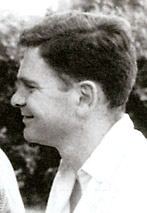Silverness Yellowing
“Diary of a Fruit Farmer.” This article almost sounds like a
joke, certainly a niche interest. But that was James Schuyler, where his head
was at.
Aug. 7= He was reading James Woodeforde’s Diary, begun 1758 and
continued until death, contains the minutia of daily life, with particular
attention to food and drink, on Aug. 22 he mentions the above article from The Countryman, Summer 1938. While
vacationing on Great Spruce Head Island the crew would take the boat over to
Deer Isle and over to the Maine main land to Camden for groceries and for yard
sales. I can imagine Schuyler picking up a box of decades old gardening
magazine for ten cents. See “Used Handkerchiefs
5¢”
The three poems (written June 30, 1969), “After Joe was at the island,”
“‘Used Handkerchiefs 5¢,’” and “The Trash Book,” are either implicitly or
explicitly addressed to Schuyler’s friend Joe Brainard, an important artist and
collagist. Christopher Schmidt in his thesis “Baby, I am the garbage”: James
Schuyler’s Taste for Waste has a whole academic theory about language and trash
among the New York School. http://digital.lib.uiowa.edu/ijcs/ijcs1011-06.htm
Mostly I find it humorous=used handkerchiefs, though I’m not sure why because
I’ve bought used handkerchiefs at the thrift store at least once or twice in my
life.
Then in searching the World Wide Web I found this:
In the Joe Brainard Archive
Special Collections & Archives, UC San Diego Library
Box 1, Folder 2
Some Blue Gay Porn - Construction, 10 x 7 3/4 oval 1975
Four collages and one ink drawing on 4 1/2 x 3 paper stuffed
in envelope with blue ink lettering and wash on front and blue-checked contact
paper on back; placed in blue-bordered handkerchief; placed in blue-jean pocket
mounted on plywood.
--and the juxtaposition makes me weepy. One man’s trash is
another man’s art—mediated by the threads of these very special relationships.
Finding treasure where others see only trash.
Used Handkerchiefs 5¢
Clean used ones, of course. Also a dresser scarf, woven with
a pattern of pansies looking alternately to right and to left; a pillowcase
full of carpet scraps; underdrawers of cambric with an edging of tatting;
black—shedding jet and bugles—crêpe, as stuffed with dust and as damp, or as
dry, as the wrinkled hand of someone too old to die who dies because to wake up
this morning just slipped her mind; bent giant postcards; Mount Pelée and a
fruitless wonderland of ice prisms, clear water-diluted color chunks: blue,
pink, and green; sagging brown metal-threaded tapestry cloth within gothic arch
of a table Motorola hiding a speaker from which once sped Flagstad’s more than
melodious shriek and, over-enunciated as plumes wrapped in papers printed
“Biscayne Farms,” once trotted, like a quick creek, the news that flaming
passengers were falling from the Hindenburg, a voice that left itself a small
puddle of kerosene on the linoleum; then there is your face, floating up the
stairs, big-eyed into the trash-and-treasures loft from which, finally, dressed
for tennis as you came, you go down again with a find in hand; a slab of undyed
linen its silverness yellowing like a teaspoon from egg yolk, ironed with too
coll an iron so the washing crush marks make a pattern over the weave and,
above the thick welt of the hem, a cross-stitched border of spruce and juniper
unstylized (unless style is simply to choose) in shades of drab that sink in,
or merge from: the hand towel od today, embroidered forty some maybe years ago.

Comments